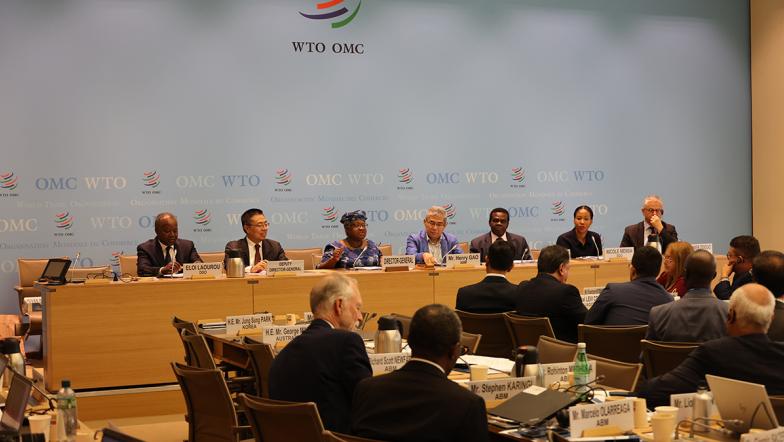WTO Chairs Programme holds Annual Conference

A year after the successful 12th Ministerial Conference (MC12) and with an eye on MC13 early next year, the WTO is playing host to the Annual Conference of the WTO Chairs on 21-23 June, with a focus on the needs and interests of developing and least developed country (LDC) economies. The WTO Chairs Programme (WCP) aims to enhance knowledge and understanding of the trading system among academics and policy makers in developing and LDC economies through curriculum development, research and outreach activities by universities and research institutions.
The Annual Conference will feature a series of sessions and panel discussions focusing on issues relevant to the WTO's work agenda as well as to the challenges currently facing the multilateral trading system. These issues include investment facilitation, digital trade, sustainability, support for LDCs and the reglobalization of trade, among others.
Director-General Ngozi Okonjo-Iweala underlined to the 34 participating Chairs the important outreach role they can play in providing intellectual support for the WTO's work at a time of polycrisis. She particularly emphasized the role the Chairs can play in highlighting the importance of reglobalization, or of bringing more people and places from the margins of global production and trade networks into the mainstream.
“As you talk about the conjuncture we're in, the geopolitical tensions, the uncertainty that this creates, there are solutions and we can find opportunities in the challenges,” she said.
As members work to implement MC12 outcomes and deliver more results at MC13 and beyond, the Chairs Network has a vital role to play in relaying to us the real problems and needs on the ground that should inform our agenda here in Geneva," she said. “You are our eyes and ears, bridging the gap between Geneva and the regions and nations where you are based.”
In his welcoming remarks to the participants, Deputy Director-General Xiangchen Zhang said he looked forward to a successful conference. “I encourage you to challenge the status quo and bring in fresh perspectives, charting the way forward for future negotiations,” he said.
Reflecting on his recent visits to WTO Chairs in Asia and South America, he touted the value the Chairs add for the WTO, saying: “Through these interactions, it became clear that our Chairs are enthusiastic about making substantial contributions to the project's success. Their solid understanding of the policy landscape undoubtedly promises fruitful outcomes.”
Ambassador José R. Sánchez-Fung, the Permanent Representative of the Dominican Republic and Chair of the Committee on Trade and Development, also attended the opening of the Annual Conference.
“I see the impact of the Programme's capacity-building efforts extending beyond the individual beneficiary countries — contributing to a more inclusive and balanced global trade landscape,” he told the participants. “By facilitating meaningful participation of developing countries in international trade negotiations, it is likely to foster a stronger voice for these countries in shaping the rules and regulations of the multilateral trading system.”
Representatives from WCP donors — Ambassador Yun Soeng Deok from the Republic of Korea, Deputy Permanent Representative Jeremy Green from Australia and Director General Cynthia Zimmermann of Austria's Federal Ministry for Labour and Economy — attended the start of the conference. Also attending was Etienne Oudot de Dainville, the Permanent Representative to the WTO for France, which is the largest donor to the WCP. Mr Oudot de Dainville will be chairing a dedicated session on the climate-trade nexus during the conference.
With its focus on research, curriculum development and outreach, the WTO Chairs Programme has a proven capacity to deliver measurable results many years after WTO funding has elapsed. Ms Zimmermann highlighted this aspect of the programme, saying: “As a representative of a donor country, I am happy to see that independent external evaluations have reported that the Chairs Programme has had positive impact on developing and least-developed country members. The Programme generates excellent long-term sustainability by capitalizing on academic specialization and increasing capacity in the beneficiary countries at the selected universities.”
Ambassador Yun spoke on the importance of the WTO Chairs Programme, telling participants: “The Korean government agrees with the Programme's vision that the benefits of the multilateral trading system can be distributed more efficiently by strengthening home-grown knowledge of trade in the developing regions.”




